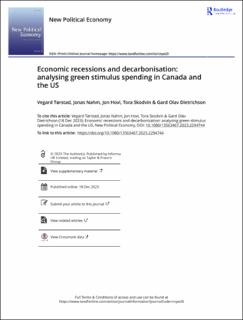| dc.contributor.author | Tørstad, Vegard Heggelund | |
| dc.contributor.author | Nahm, Jonas | |
| dc.contributor.author | Hovi, Jon | |
| dc.contributor.author | Skodvin, Tora | |
| dc.contributor.author | Dietrichson, Gard Olav | |
| dc.date.accessioned | 2024-04-09T08:08:48Z | |
| dc.date.available | 2024-04-09T08:08:48Z | |
| dc.date.created | 2023-12-19T11:29:18Z | |
| dc.date.issued | 2023 | |
| dc.identifier.issn | 1356-3467 | |
| dc.identifier.uri | https://hdl.handle.net/11250/3125430 | |
| dc.description.abstract | Existing research has demonstrated that government policies often prioritise growth over climate during economic downturns. Yet government stimulus spending during economic downturns also offers an opportunity for decarbonisation through long-term investments in infrastructure, transportation electrification, building efficiency, and clean energy technologies able to reduce emissions and sustainably shift the economy away from fossil fuels. We study the size and distribution of green stimulus spending in response to two recent economic downturns – the 2008 financial crisis and the 2020 Covid-19 pandemic. Focusing on Canada and the US – two major economies with strong incumbent fossil fuel interests – we explore the determinants of green stimulus spending. Counter to conventional wisdom, our findings provide little evidence to support the notion that institutional permeability to industry lobbying influenced the share of green stimulus spending. Instead, drawing on a novel dataset on green recovery spending and lobbying, we show that the strength of liberal parties in the legislatures shapes the distribution of stimulus funds. Our analysis suggests that liberal parties committed to decarbonisation can leverage economic crises to align economic and climate policy making, even in the face of strong lobbying efforts by the fossil fuel sector. | en_US |
| dc.language.iso | eng | en_US |
| dc.publisher | Taylor and Francis | en_US |
| dc.rights | Navngivelse 4.0 Internasjonal | * |
| dc.rights.uri | http://creativecommons.org/licenses/by/4.0/deed.no | * |
| dc.subject | Climate policy | en_US |
| dc.subject | Economic recessions | en_US |
| dc.subject | Green industrial policy | en_US |
| dc.subject | ingstimulus spending | en_US |
| dc.subject | Stimulus spending | en_US |
| dc.title | Economic recessions and decarbonisation: analysing greenstimulus spending in Canada and the US | en_US |
| dc.title.alternative | Economic recessions and decarbonisation: analysing greenstimulus spending in Canada and the US | en_US |
| dc.type | Journal article | en_US |
| dc.type | Peer reviewed | en_US |
| dc.description.version | publishedVersion | en_US |
| dc.rights.holder | The Authors | en_US |
| dc.source.journal | New Political Economy | en_US |
| dc.identifier.doi | 10.1080/13563467.2023.2294744 | |
| dc.identifier.cristin | 2215477 | |
| dc.relation.project | Norges forskningsråd: 324468 | en_US |
| cristin.ispublished | true | |
| cristin.fulltext | original | |
| cristin.qualitycode | 2 | |

